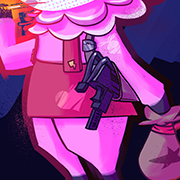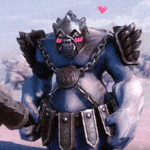|
The kind of microtransactions that get my goat are the ones that don't directly tie with a known purchase outcome - buying keys to unlock boxes and getting a random drop. Overwatch particularly. With some games you can either grind for random drops with the option to pay to buy the thing you want outright, but OW goes a step further and denies you that, giving you the choice of grinding or paying for more rolls of the dice. But then I'm not the money guy with the figures justifying the benefits of this kind of loot box monetisation, but that doesn't mean I have to like it or play games with it in. 
|
|
|
|

|
| # ? Apr 20, 2024 01:32 |
|
GC_ChrisReeves posted:Overwatch particularly. With some games you can either grind for random drops with the option to pay to buy the thing you want outright, but OW goes a step further and denies you that, giving you the choice of grinding or paying for more rolls of the dice. A major reason people hate free-to-play models and microtransactions so much is that it's one of the only ways people have monetized their product that doesn't involve making the game better for consumers. Almost everything else developers do is strictly to make their product more fun for more people, but microtransactions don't, they just generate money. It's sad but I get why everybody does it.
|
|
|
|
ninjewtsu posted:how do you feel about tf2's weapons drop system? I have a very different relationship with TF2 - I used to play it quasi-competitively and so I think about that game a lot more as a player than I do a neutral 3rd party. That said, I don't *really* have a problem with it. It kinda of gets a grandfather pass as I think it gets credit for being the first major game to introduce crates. Then there was the whole trading system to support it and if we are being honest, most base weapons are effectively free if you know how to navigate the trading communities. The problem is that that is a big 'if'. TF2 is an easy game to get into, but a difficult community to navigate. So since I've gotten nowhere close to actually answering your question, I close with this: I think TF2's economy and crate system is very clumsy compared to its modern counterparts. I definitely wouldn't say it's fine the way it is, but because of circumstance and timing, I'm more willing to forgive it's shortcomings than I am almost any other game.
|
|
|
|
Apropos of nothing, as a game artist, I think vanilla Team Fortress 2 has some of the most focused and successful art direction of any game ever. HOT TAKES ITT
|
|
|
|
Canine Blues Arooo posted:That said, I don't *really* have a problem with it. It kinda of gets a grandfather pass as I think it gets credit for being the first major game to introduce crates. Then there was the whole trading system to support it and if we are being honest, most base weapons are effectively free if you know how to navigate the trading communities. The problem is that that is a big 'if'. TF2 is an easy game to get into, but a difficult community to navigate.
|
|
|
|
theflyingorc posted:Also weren't the stock weapons best-in-slot for a great number of the classes? For pretty much every class that was 'important' (Scout, Soldier, Demo, Medic), this is mostly true with a handful of exceptions here and there. I don't really want to welcome that argument as a justification because part of the fun of modern TF2 is the huge number of loadouts, but it didn't really introduce power creep either.
|
|
|
|
Canine Blues Arooo posted:For pretty much every class that was 'important' (Scout, Soldier, Demo, Medic), this is mostly true with a handful of exceptions here and there. I don't really want to welcome that argument as a justification because part of the fun of modern TF2 is the huge number of loadouts, but it didn't really introduce power creep either. People are pretty chill about weapons for loadouts being non-selectable as long as none of them are viewed as "necessary to play the game". Which means "Can be slightly more optimal on paper, even in situations that will never happen"
|
|
|
|
Applesnots posted:How do devs feel about the upswing of micro transactions in full priced AAA titles? MTX in a full-price game can mean a lot of different things. I broadly lean toward ďextension of experienceĒ feeling good and ďright.Ē I donít regret the money I spent multi-boxing UO, EQ, or Eve. I donít regret the cash Iíve given Warframe. I donít regret the cash I spent on heroes or boosts for League. If the Dwarf Fortress guys broke their stuff up and sold new biomes, Iíd buy every one. I donít regret buying modules or miniatures for D&D. I enjoy those games and what I spend on them lets me enjoy them more. When a game experience is more engineered to drive purchase through mechanics (and this is a little ďI know it when I see itĒ since everything can be seen as, on some level, being exactly this), I lose interest. Overall, there isnít a lot of open discussion about the financial reality of this stuff because, from a profit and loss standpoint, players donít care. They donít grade on a curve. But, since people here are interested in the nuts and bolt of it, you guys understand that, over the history of this, the cost of making a game has gone to the moon while the price players pay for a game has taken a complete nosedive, right? We are seeing (and will see more) stuff like MTX in full price games not because everyone is greedy but because itís increasingly not viable to not have something along those lines if you want to continue making games.
|
|
|
|
theflyingorc posted:...very nearly everything in Overwatch can be gained by playing the game more? Very nearly everything currently available has a gold cost or comes from loot boxes. But my point is I can't just go "hey I want *that* Symmetra skin right now, it looks great I'd even throw you a couple of quid for that!" Instead the game would rather I either play the game for a long time, or game modes i can't stand hoping for that to drop or til I eventually accrue enough in-game credits to buy with that or use actual money to buy more loot boxes - more rolls of the dice It's great that you can get it without a single penny invested given enough time, but it's the randomness that gets me, gimme an honest storefront where i can get what i want rather than trying to grift time or the chance of more money on loot boxes out of me :L I reiterate that yeah, this is just a preference for me. I'm not saying it's all bad and should be burned down. GeeCee fucked around with this message at 20:23 on Sep 27, 2017 |
|
|
|
GC_ChrisReeves posted:But my point is I can't just go "hey I want *that* Symmetra skin right now, it looks great I'd even throw you a couple of quid for that!" Instead the game would rather I either play the game for a long time, or game modes i can't stand hoping for that to drop or til I eventually accrue enough in-game credits to buy with that or use actual money to buy more loot boxes - more rolls of the dice
|
|
|
|
theflyingorc posted:Also weren't the stock weapons best-in-slot for a great number of the classes? Ehh, how important unlockable/droppable weapons were was always pretty murky. And Valve was never good at creating a fair system to distribute them.
|
|
|
|
mutata posted:Apropos of nothing, as a game artist, I think vanilla Team Fortress 2 has some of the most focused and successful art direction of any game ever. HOT TAKES ITT I know that "game devs like different games than players" was touched on earlier, but are there any games that you guys find particularly exemplary for your field? Like, if you're an artist, and were teaching a class on game art or something, what games would you want to have studied? Or what games are really interesting/solid from a design perspective?
|
|
|
|
ninjewtsu posted:are there any games that you guys find particularly exemplary for your field? Like, if you're an artist, and were teaching a class on game art or something, what games would you want to have studied? Or what games are really interesting/solid from a design perspective? Guilty. Gear. Xrd. 3d is not averse to bending the rules to make a thing look good but Xrd took the traditional 3d art playbook and lit it the gently caress on fire. - The 2D hand-animated animators-intent look came before everything else, anything that looked too 3d/Next-gen was removed. - Frame rate of the characters artificially dropped and interpolation between frames removed to help push the 2d animated look - Characters are 100% flat textured (except v minor details). - Each character has their own light source and that lighting is adjusted BY HAND, on EVERY FRAME by tweaking vertex normals til the shadows fell over the character exactly as intended. - Meshes are contorted, squashed and stretched for maximum animation punchiness. Yeah those still frames of Overwatch's McCree being "broken" and exaggerated when he rolls? That's intended, old school animation principles at work. There's the whole GDC talk that Arc System Works gave on the subject here: https://www.youtube.com/watch?v=yhGjCzxJV3E I think this talk is hugely important for 3D students as it's a great demonstration of the desired look demanding solutions, rather than doing what is taught and is normally considered industry standard. These guys put the desired look above everything else and worked their way there. There are few studios that can put out games that look like theirs right now. Also their Dragonball Z game looks siiiiiiiiick!! https://www.youtube.com/watch?v=xzqRyC9RQpw GeeCee fucked around with this message at 00:11 on Sep 28, 2017 |
|
|
|
ninjewtsu posted:I know that "game devs like different games than players" was touched on earlier, but are there any games that you guys find particularly exemplary for your field? Like, if you're an artist, and were teaching a class on game art or something, what games would you want to have studied? Or what games are really interesting/solid from a design perspective? My list is fairly substantial, so here's a condensed version of some more recent and popular games: - The Orange Box (Fairly simple geometry but with fantastic texture work that relies on large swaths of color, and very small bits of interesting micro detail) - Ragnarok Online (Amazing sprite work that still holds up even to this day) - World of Warcraft (All of Blizzard's games really, but this is where their current style was born, and later copied by many companies ever since) - Uncharted 3 (Boon Cotter's lighting work is phenomenal, the tech behind the dirt and fabric and deformation of props is incredible, and every two minutes is another jaw-dropping vista) - Horizon Zero Dawn (phenomenal environment and character art, and super cool cloud tech) - Destiny (Top tier environment art, mechanical hard surfaces, weapons, lighting and 2d branding and iconography) - Bastion/Transistor/Pyre (Supergiant's style is only possible with a mastery of art fundamentals and really top notch painting skills) - The Order (Ushered in the PBR age. Still one of the best looking games ever) - Bioshock 3 (All around fantastic aesthetic) - Legend of Zelda: Breath of the Wild (Taught us that you don't need 4k textures to have a gorgeous looking game. Sound fundamentals, bold shapes, smart use of color) - Mirror's Edge (How to lead a player through a level and indicate what a player can interact with, at its most basic level. Also very strong lighting throughout)
|
|
|
|
How specialized do developers tend to be? I've seen games where the full credit list is just a few names to games where they rival a big studio film. Do you prefer working in big teams where you are doing a small part or do you prefer small teams where most people wear multiple hats? I've been involved in a big mod project for the past few years and started to seriously look at applying to industry jobs a few months ago. Other than a few level design jobs, most of the listings I've seen have been for programmers and ui. Do other types of design jobs tend to be more scarce or are the more technical positions in particularly high demand?
|
|
|
|
Emerson Cod posted:How specialized do developers tend to be? I've seen games where the full credit list is just a few names to games where they rival a big studio film. Do you prefer working in big teams where you are doing a small part or do you prefer small teams where most people wear multiple hats? My current project is 20 people. I am the 3D artist. Anything that needs a mesh and/or textures, I do it. Characters, NPCs, props, items, environments, everything. When we need some concept art that isn't massively important or complex, I can do that too. Luckily we also have a fulltime animator and a UI artist because I hate doing those bits but, again, I could do it in a pinch. There are so many upsides and downsides to big vs small projects. On big projects you can end up feeling a bit like a small cog in a very large machine, with little autonomy or variation in your role. Big projects have bigger budgets though, so you get more people in support roles, more tech, etc. On small projects you take on a lot more responsibility(that in itself is a double-edged sword) and have more chances to make a big impact on the overall project. I like the office atmosphere of my small team better than I did the big one, but being small we don't have the same kind of budget and support that a big project does. When I worked in a big team I thought small teams are better. Now that I'm on a small team there are a lot of things about big teams that I miss. Not sure I can say which one I prefer overall.
|
|
|
|
I've worked for almost 6 years as a programmer on a (mainly) mobile studio who has a quite successful TD series. mutata: I don't have PMs and I couldn't find your email to verify.
|
|
|
|
Emerson Cod posted:How specialized do developers tend to be? I've seen games where the full credit list is just a few names to games where they rival a big studio film. Do you prefer working in big teams where you are doing a small part or do you prefer small teams where most people wear multiple hats? Specialist vs. generalist is a culture thing at a lot of places. The larger the dev, the more people tend to be specialists. I have worked both. They are very different beasts. Small teams tend to be close and fast and agile. Larger teams can get absurd amounts of work done in an absolute sense and itís fun to see that stuff happening. Same time, large teams get bogged down easily, direction setting is a challenge, and you end up in a lot of meetings. When asked about getting started in the business, I always steer people toward small teams. A new person at a small team, no matter how junior, is going to do some of everything because everyone on a small team has to do some of everything. A new junior person on a large team is likely to get a very small, very defined box to live in. The larger team option still often wins out because people perceive spots on larger teams to have more stability Ė donít be fooled.
|
|
|
|
ninjewtsu posted:I know that "game devs like different games than players" was touched on earlier, but are there any games that you guys find particularly exemplary for your field? Like, if you're an artist, and were teaching a class on game art or something, what games would you want to have studied? Or what games are really interesting/solid from a design perspective? Spelunky. It's not an uncommon one either. It's generally regarded as a must-play among most of the other devs I talk to. Solid pacing, pretty good difficulty curve, fantastic use of procedural generation, great use of elements interacting with each other, etc. It probably has more in common with something like Dishonored or System Shock than most platformers. You could probably teach a class about how successful that game is at tutorializing its nuanced mechanics simply by trial-and-error, which builds very well into how the game is meant to be played. Also, it's very pretty. I'm no artist but the overall direction is very cohesive and easy on the eyes. e: I'd also HIGHLY recommend Watch_Dogs as a masterclass in every bad idea happening all at once. It's the only game I've finished out of spite in order to fully understand every confused idea in it, and I lend my personal copy to co-workers when they ask why I'm so upset about it. As a developer I like to think I'm above the 'gamer rage' and whatnot but that game does terrible things to my psyche. I stopped buying Ubi games for a couple years after it, and not just because of the hype problems. e2: Apologies if any Ubi folks are in the thread and if you worked on it. 
Chunderstorm fucked around with this message at 19:29 on Sep 28, 2017 |
|
|
|
Chunderstorm posted:You could probably teach a class about how successful that game is at tutorializing its nuanced mechanics simply by trial-and-error, which builds very well into how the game is meant to be played. Portal is very good for showing this technique too. Of late, the game my crowd discusses as a game only game designers / devs love is Dream Quest.
|
|
|
|
Chunderstorm posted:I'd also HIGHLY recommend Watch_Dogs as a masterclass in every bad idea happening all at once. It's the only game I've finished out of spite in order to fully understand every confused idea in it, and I lend my personal copy to co-workers when they ask why I'm so upset about it. As a completionist trying sadly to eke the last handful of percentage points of completion out of that horrible game, I'd love to hear more about your perspective on what went wrong there, in as much detail as possible. Ubisoft open world games are a sick fascination for me, both to complete and to ogle the mechanical results of such a massive development enterprise. Discendo Vox fucked around with this message at 21:16 on Sep 28, 2017 |
|
|
|
Discendo Vox posted:As a completionist trying sadly to eke the last handful of percentage points of completion out of that horrible game, I'd love to hear more about your perspective on what went wrong there, in as much detail as possible. Ubisoft open world games are a sick fascination for me, both to complete and to ogle the mechanical results of such a massive development enterprise. I mean - they really needed to pare down their feature set. They clearly just threw everything they thought of into the pot, and then they didn't do anything to slowly teach you the mechanics, they just unleashed you on Chicago. And they didn't make sure they were communicating effectively - I was like 5 hours into the game before I realized the girl who died was my niece, not my daughter.
|
|
|
|
Even as someone who has a soft spot for WD1, I was baffled at the inclusion of what, four different chess minigames?
|
|
|
|
Discendo Vox posted:As a completionist trying sadly to eke the last handful of percentage points of completion out of that horrible game, I'd love to hear more about your perspective on what went wrong there, in as much detail as possible. Ubisoft open world games are a sick fascination for me, both to complete and to ogle the mechanical results of such a massive development enterprise. Sure! For anyone reading my perspective on this though, bear in mind that I do not, nor have I ever worked at any Ubisoft studio or on any Ubisoft project. My insight here comes from my time in the game industry, but I can only speculate based on what I know. I think the issues with Watch_Dogs likely boiled down to the following: 1) It was a new IP. Most Ubi properties have a history; namely Assassin's Creed and Far Cry. Both were much smaller games in their initial incarnations, with a much clearer focus and idea due to the smaller team size. It gets exponentially harder to hold a clear vision has studio size and involvement ramps up. I think this is shown very clearly in Assassins' Creed Revelations and ACIII, where the idea of "just throw more stuff in" was in full effect, so that even when the stuff was out of place, it was still relatively grounded in being Assassin's Creed. Watch_Dogs oscillates back and forth between being totally grounded in reality and being a sci-fi cyberpunk dream sequence, and hits just about everything in between. It feels like the driving creative vision was "something something police state and also computers maybe." I personally hate the aesthetic of Watch_Dogs 2, but you can tell it's a lesson they learned. It's a lot more unified, even if it's not particularly enjoyable. 2) It was a new genre for them. Even though it sort of fits the mold of the 'open world Ubisoft game,' there's a reason that there are only a couple franchises that do the open-world city thing and do it well. Everyone remembers GTA IV having atrocious driving, and I'd imagine that has to do with the changes to the physics engine for the new console generation (if we have some Rockstar folks in here, I'd love if you'd correct me on this). Driving in games is not an easy task. Saints Row 2 nailed it, GTAV nailed it, and in Watch_Dogs 2 it's certainly improved over the first game. It also likely needed some engine changes in order to support cars, do all the hacking stuff, etc. Lots of technical debt in making your engine do new stuff. 3) It was a console generation launch title, but also launched on previous gen hardware. Even with ancillary studios driving the ports, PS4/XBO have pretty similar hardware and architecture. Porting these days is pretty easy. Porting between X360 and PS3 is a chore due to the vastly different architecture, and then there was a Wii U port as well. So you had technical considerations for past hardware, technical considerations for current hardware, a huge amount of E3 hype, and then... a 6-month delay. It's pretty apparent the game had a troubled development (the 6-month delay is pretty tell-tale there), and releasing a game for a new console launch when the hardware itself might still be in a prototype phase is pretty gnarly.
|
|
|
|
Once you're working a position as a junior developer or low level art person or something, how easy is moving up in the ranks? If you have talent, does that generally get recognized and someone throws you a bone and puts you in a more important position later, or do you usually have to play office politics to get anywhere?
|
|
|
|
ninjewtsu posted:Once you're working a position as a junior developer or low level art person or something, how easy is moving up in the ranks? If you have talent, does that generally get recognized and someone throws you a bone and puts you in a more important position later, or do you usually have to play office politics to get anywhere? All depends on the studio! I started at entry level QA at Bethesda, and enough time in there plus some enthusiasm netted me a chance to work up in the studio on Fallout 4 doing crash debugger stuff with the devs. I don't work there anymore, but the guy who stuck around is now imbedded up there now. At my current studio it's small enough that there isn't enough QA work all the time, so I get to do engineering and design stuff pretty often, and it's pretty likely that I'll stop the QA at some point. Really just depends on where you are, who takes notice, and whether there's an opening needing to be filled.
|
|
|
|
ninjewtsu posted:Once you're working a position as a junior developer or low level art person or something, how easy is moving up in the ranks? If you have talent, does that generally get recognized and someone throws you a bone and puts you in a more important position later, or do you usually have to play office politics to get anywhere? "Talent" in this case is being able to do the job above you. What distinguishes a Junior Artist from a Senior or Lead? It's more about being on top of things, and working as a team than it is about some raw talent. Obviously people shouldn't be undermining anyone else or other process. But, if an Artist, say, started tracking the status of all their work in a spreadsheet. If they chase up reviews and are generally highly proactive about making the whole process slick. That's someone who i'd be thinking "ok, they are ready for more responsibility and ownership within the team". However, that decision is still being made a person. They are going to have their biases, preferences, and constraints. If you're in a small company, they can pretty much do what they want, so your personal relationship with them is probably a major factor in the promotion. If you're in a huge company, there are probably heavily codified progression paths, and making sure that you help them tick the boxes to ok your promotion is important.
|
|
|
|
ninjewtsu posted:Once you're working a position as a junior developer or low level art person or something, how easy is moving up in the ranks? If you have talent, does that generally get recognized and someone throws you a bone and puts you in a more important position later, or do you usually have to play office politics to get anywhere? It can depend more on the company rather than your actual field of expertise. Working in a small/mid-sized company in a fast moving genre/market can open up a lot more opportunities than working at a massive company with dozens of other employees having seniority on you. It's also not unusual for videogame companies to poach talent from other companies or hire freelancers to fill senior roles if they think internal staff lacks veterancy. The quickest way of moving up to your desired role/salary is job hopping between companies rather than sticking to one company and working your way up.
|
|
|
|
As someone who has spent (checks) 110 hours beating my head against WatchDogs 1, and way longer reading about it and watching others dissect it, I've had the opportunity to spot some of the remnants of what was cut, what was changed, etc- and it's pretty weird and horrible what went into development. I'm not a dev, though, so I'll take it elsewhere.
|
|
|
|
mutata posted:Most of the friend-devs I know work in non-mobile/non-F2P offices and they seem to bristle the closer microtransactions get to gambling. Funnily enough, I was going to ask something related to this. There are people who feel that loot-boxes are becoming quasi-gambling and I was wondering if you or other devs have felt concern that there may be a point where authorities (fairly or unfairly) clamp down on the whole practice? Is there any concern that governments may start, for example, applying gambling laws to some games or bringing in new legislation to target games that sell lootboxes for real money or otherwise enable this quasi-gambling? If this were to happen, would you be worried about this reaching further than its intended targets and impacting the gaming industry as a whole?
|
|
|
|
That's legitimately a question I have as well, because one of the excuses for why PSO2 is never coming over the sea is gashapon stuff & gambling but isn't that identical to loot boxes?
|
|
|
|
Latin Pheonix posted:Funnily enough, I was going to ask something related to this. Japan have outruled "kompugacha". In "kompugacha" you would get, for example, the leg of a SUPER POWERFUL ROBOT out of the gacha. And you go "cool that's 1/6 of the parts!". And then you get the other leg. And the arms. And the chest. But you need the head. And the head has a drop rate of one hundredth of the other parts. It was considered a misleading business practice because the parts are useless in themselves, and your perception of the drop-rate of the last piece was being deliberately anchored away from reality. China have ruled that gacha/loot boxes need to publish the drop rates in game. That means that saying "Chance of 6* Super Rare!" has a bit less power because you can see that the chance is actually 0.01% It's a matter of time before the US and Europe adopt similar policies. People have blindspots around probability in general, and even with fair results would have messed up expectations. Hypothetical example; an RPG has an AWESOME end-game Armor set consisting of 5 pieces. Each of these have an equal (but low) chance to drop from the big boss. Given that it takes you a week of running it to get your first piece, how many more weeks before you have the complete set? You might think the answer is "about four". But the average would be nearer 10. It'd take you slightly over a week to get the next piece, but with each piece you get the odds of getting a piece you don't have get slimmer. Getting the very last piece would take 5 weeks of grind. That's deliberately shorn of any monetisation, but you could easily add, say, a microstransaction item that doubled the drop rate of that gear. I know people get icky feelings when they start applying money to these things, but I think that time is as precious of a resource.
|
|
|
|
MissMarple posted:There have already been moves into regulation. Yeah, this was what got me thinking about regulation, but even China's approach seems a bit soft, especially because of your point about blindspots to probability (which I totally agree with). Gamblers usually know the odds are stacked against them, but believe they can beat them because "I'll be that 0.01%, I just know it!", so showing them odds isn't that useful. I'm more wondering about whether there's any concern of an outright ban on the practice, or treating it in the same way as casino gambling (e.g. 18+ only, licenses required, etc.).
|
|
|
|
Considering that folks will spend thousands if not millions on cs skins or second life lots I'm surprised this stuff isn't already regulated in some way.
|
|
|
|
MissMarple posted:People have blindspots around probability in general, and even with fair results would have messed up expectations. That actually makes me wonder, to what degree are such things mathed out by the developers beforehand (let's say for non-monetised systems for simplicity's sake)? Is there some designer whose job it is to decide "We want X item to drop after an average of Y hours playtime" or "We want X% of players to see this happen during a single average playthrough", and who then sits down to calculate the appropriate distributions and plugs in those drop chances? Or is it more a matter of people plugging in some roughly estimated default value and then adjusting that based on playtesting? The answer is probably "depends on the studio", but I guess with the huge role that randomisation takes in a whole lot of games some sort of industry standard might have developed.
|
|
|
|
Latin Pheonix posted:Funnily enough, I was going to ask something related to this. I think companies actually have to report lootbox droprates if they distribute to certain countries because of financial regulations.
|
|
|
|
Perestroika posted:That actually makes me wonder, to what degree are such things mathed out by the developers beforehand (let's say for non-monetised systems for simplicity's sake)? Is there some designer whose job it is to decide "We want X item to drop after an average of Y hours playtime" or "We want X% of players to see this happen during a single average playthrough", and who then sits down to calculate the appropriate distributions and plugs in those drop chances? Or is it more a matter of people plugging in some roughly estimated default value and then adjusting that based on playtesting? "We want X item to drop after an average of Y hours playtime". Lots of people will balance around ideas like this, but they forget this is the AVERAGE experience. What does the game look like for the lucky 1%, and the unlucky 1%? The people at either end of that curve? Someone gets X item after 10 minutes, and it utterly destroys the early game experience because it's brokenly good if you have it in the first 10 hours of the game. Then you've got the die hard fan who has been playing for 2 years, every single night, and it still hasn't dropped! And every "yay gratz!" in Alliance chat for a person who has been playing for just a few months reopens the wound. Probability is the nemesis of the player and the designer.
|
|
|
|
"We want X item to drop after an average of Y hours playtime". It's s good idea to just tie the drop rate chance to time committed rather than keep the chances random. Like after X hours or missions the chance increases
|
|
|
|
MissMarple posted:I, personally, do that a lot. That's partly because in years of experience i've learned a lot of people REALLY don't get probability and so I do it myself, but you also hit upon a really dangerous word : AVERAGE. I remember this really well from vanilla World of Warcraft. A chest that has a 50/50 chance of dropping either a priest weapon quest item or a hunter one. And the guilds that after months and months of clearing the place still only got just one of them every single time. On the flip side it led to some pretty funny theories about how to game the instance seeds by having certain classes enter the instance first, or have it be the raid leader/not the raid leader. Average is dangerous.
|
|
|
|

|
| # ? Apr 20, 2024 01:32 |
|
DevOps guy here. Can anyone speak to how their companies have handled stuff like CI, automated builds, environment provisioning, and so forth?
|
|
|






























